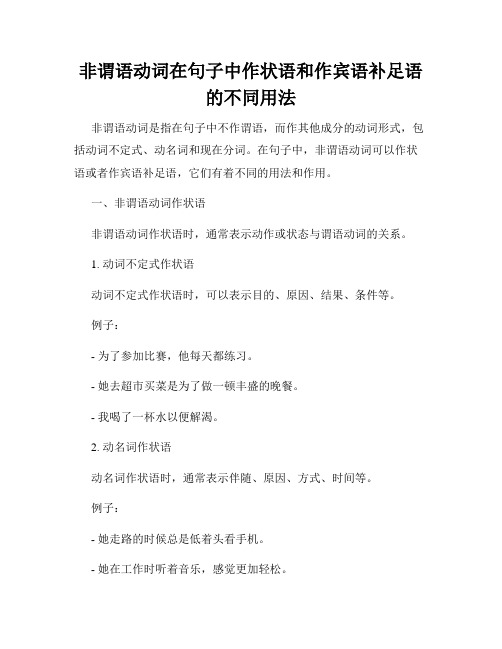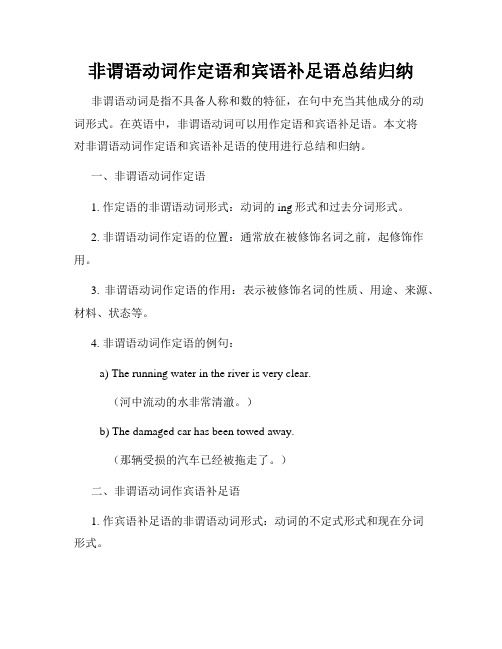教师版非谓语动词作宾语补语
非谓语动词作定语和宾语补足语总结

非谓语动词作定语和宾语补足语总结非谓语动词是指不带有谓语成分的动词形式,包括动词不定式、动名词和现在分词、过去分词。
在句子中,非谓语动词可以用作定语和宾语补足语,用于修饰名词或补充说明动作的情况。
本文将对非谓语动词作定语和宾语补足语的用法进行总结。
一、非谓语动词作定语非谓语动词作定语时,通常与被修饰词之间存在逻辑上的主动或被动关系。
常见的用法有以下几种:1. 动词不定式作定语动词不定式作定语时,说明所修饰名词的用途、目的、结果等。
常见结构为“名词 + 不定式”,不定式可以是带to的原形,也可以是不带to的原形。
例如:- 他有个完全实现梦想的机会。
- 这个女孩太害羞了,从不和人交流。
2. 动名词作定语动名词作定语时,表示该名词的用途、目的、结果等。
常见结构为“动名词 + 名词”。
例如:- 听力训练是学习英语的重要环节。
- 这本书是关于如何提高写作技巧的。
3. 现在分词作定语现在分词作定语时,表示所修饰名词正在进行的动作或状态。
常见结构为“现在分词 + 名词”。
例如:- 拉着行李箱的女人是我的妈妈。
- 那个躺在床上的男孩是我的弟弟。
4. 过去分词作定语过去分词作定语时,表示所修饰名词已经完成的动作或状态。
常见结构为“过去分词 + 名词”。
例如:- 这本被翻阅过许多次的书籍是我的宝贝。
- 我看过的那部电影非常精彩。
二、非谓语动词作宾语补足语非谓语动词作宾语补足语时,用于补充说明宾语的动作或状态。
常见的用法有以下几种:1. 动词不定式作宾语补足语动词不定式作宾语补足语时,说明宾语完成的动作。
常见的结构为“动词 + 宾语 + 不定式”。
例如:- 我喜欢听音乐。
- 她希望学好英语。
2. 动名词作宾语补足语动名词作宾语补足语时,表示宾语的动作或状态。
常见结构为“动词 + 宾语 + 动名词”。
例如:- 我通常喜欢读书。
- 他不值得你浪费时间。
3. 现在分词作宾语补足语现在分词作宾语补足语时,表示宾语正在进行的动作。
非谓语动词作主语和宾语补足语

非谓语动词作主语和宾语补足语非谓语动词是一种不具备人称和时态的动词形式,包括不定式、现在分词和过去分词。
非谓语动词可以在句中充当主语和宾语补足语,起到补充说明和修饰的作用。
本文将详细介绍非谓语动词作主语和宾语补足语的用法和特点。
一、非谓语动词作主语1. 不定式作主语不定式作主语时,常常位于句首,其后跟随一个动词或介词短语作谓语。
例如:To learn a foreign language requires patience and perseverance.学习一门外语需要耐心和毅力。
2. 现在分词作主语现在分词作主语时,常常强调动作正在进行。
例如:Running in the morning is good for your health.早上跑步对身体健康有好处。
3. 过去分词作主语过去分词作主语时,常常表示被动或已经完成的动作。
例如:Broken glass is dangerous, so be careful.破碎的玻璃很危险,所以要小心。
二、非谓语动词作宾语补足语1. 不定式作宾语补足语不定式作宾语补足语时,常常用于及物动词后,起到对动词的进一步补充和说明的作用。
例如:He wants to go abroad to study.他想去国外留学。
2. 现在分词作宾语补足语现在分词作宾语补足语时,常常表示主动的动作。
例如:I saw him playing basketball in the park.我看见他在公园里打篮球。
3. 过去分词作宾语补足语过去分词作宾语补足语时,常常表示被动或已经完成的动作。
例如:She had her car repaired at the garage.她把她的车送去修理了。
三、注意事项1. 非谓语动词作主语和宾语补足语时,其形式不会受到主语的人称和时态的影响。
例如:Smoking is harmful to your health.吸烟对健康有害。
2. 非谓语动词作主语和宾语补足语时,常常需要使用动词不定式的基本形式或现在分词/过去分词的原形。
非谓语动词做宾补

易错点分析
混淆非谓语动词的时态
在选择非谓语动词时,要注意其时态是否与句子的主语保持一致 。
混பைடு நூலகம்非谓语动词的语态
在选择非谓语动词时,要注意其语态是否与句子的主语保持一致。
忽略非谓语动词的否定形式
在选择非谓语动词时,要注意其是否为否定形式。
常见错误举例
He is considering _______ a new car. (buy)
分词做宾补强调动作的被动性和正在进行性,如“I heard her crying in the next room.”。
04
非谓语动词做宾补的句法功能 与作用
句法功能
动词不定式做宾补
动词不定式做宾补时,通常在句子中 位于宾语之后,表示一种未来的动作 或行为。
动名词做宾补
分词做宾补
分词做宾补时,通常在句子中位于宾 语之后,表示一种正在进行的动作或 行为,同时与宾语之间存在逻辑上的 主谓关系。
非谓语动词做宾补
汇报人: 2023-12-15
目录
• 非谓语动词做宾补的定义与特 点
• 非谓语动词做宾补的分类与用 法
• 非谓语动词做宾补的辨析与区 分
目录
• 非谓语动词做宾补的句法功能 与作用
• 非谓语动词做宾补的注意事项 与易错点
• 非谓语动词做宾补的练习与提 高方法
01
非谓语动词做宾补的定义与特 点
定义
• 非谓语动词做宾补是指动词在句子中作为宾语,其后接非 谓语动词作为补充成分,对宾语进行修饰或补充说明。
特点
宾补是非谓语动词的 一种形式,与宾语构 成复合宾语。
宾补可以表示动作的 完成、进行、接受等 状态。
宾补可以表示动作的 执行者或接受者以外 的其他成分。
非谓语动词作宾语-宾补

非谓语动词作宾语,宾补1、动词+doing 动+宾enjoy doing sth. 喜欢做某事spend...doing sth. 花费…做某事be busy doing sth. 忙于做…imagine sb. doing sth. 想象…做某事can't help doing sth. 忍不住做某事feel like doing sth. 想要做某finish doing sth. 完成做某事practice doing sth. 练习做某事miss doing sth. 错过做某事suggest doing sth. 建议做某事keep (on) doing sth. 保持(继续)做某事mind doing sth. 介意做某事be worth doing sth. 值得做某事consider doing sth. 考虑做某事2、介词+doing 介+宾(be good at doing sth 擅长做某事be interested in doing sth.对做某事感兴趣insist on doing 坚持做某事put off doing 推迟做某事be used for doing sth. 被用来做某事thank sb. for doing sth. 谢谢某人做某事be tired of doing sth. 厌烦做某事be afraid of doing sth. 害怕做某事stop sb. from doing sth. 阻止某人做某事give up doing sth. 放弃做某事without doing sth. 没有做某事think about doing sth. 考虑做某事What / How about doing 做某事怎么样look forward to doing sth. (盼望)pay attention to doing sth. (注意)be used to doing sth. (习惯于)prefer doing sth to doing sth.(更喜欢)devote to doing sth (致力于)make a contribution to doing (做贡献)~3、动词+to do 动+宾,不定式作宾语decide to do sth. 决定做某事want ∕would like to do sth. 想做某事plan to do sth. 计划做某事need to do sth. 需要做某事agree to do sth. 同意做某事afford to do 能做某事be used to do 被用来做can’t wait to do 迫不及待地要做某事make up one’s mind to do 下决心做某事used to do 过去常常做某事fail to do 失败做某事4、常用带to 的不定式作宾语补足语ask sb. to do sth. 请求某人做某事tell sb. to do sth. 命令某人做某事want sb. to do sth. 想要某人做某事invite sb. to do sth. 邀请某人做某事^expect sb. to do sth. 期待某人做某事encourage sb. to do sth. 鼓励某人做某事advise sb. to do sth. 建议某人做某事promise sb. to do 答应某人做某事warn sb. to do sth. 告诫某人做某事allow sb. to do sth. 允许某人做某事remind sb. to do sth. 提醒某人做某事help sb. (to) do sth. 帮助某人做某事5、不带to 的不定式作宾语补足语使役动词和感官动词后:feel/ hear, / let ,make, have, / see, watch, notice + sb + do/doing sth+ do表示动作的完整性,+doing 表示动作的进行性。
非谓语动词在句子中作状语和作宾语补足语的不同用法

非谓语动词在句子中作状语和作宾语补足语的不同用法非谓语动词是指在句子中不作谓语,而作其他成分的动词形式,包括动词不定式、动名词和现在分词。
在句子中,非谓语动词可以作状语或者作宾语补足语,它们有着不同的用法和作用。
一、非谓语动词作状语非谓语动词作状语时,通常表示动作或状态与谓语动词的关系。
1. 动词不定式作状语动词不定式作状语时,可以表示目的、原因、结果、条件等。
例子:- 为了参加比赛,他每天都练习。
- 她去超市买菜是为了做一顿丰盛的晚餐。
- 我喝了一杯水以便解渴。
2. 动名词作状语动名词作状语时,通常表示伴随、原因、方式、时间等。
例子:- 她走路的时候总是低着头看手机。
- 她在工作时听着音乐,感觉更加轻松。
- 他生气时喜欢一个人静静地待在房间里。
3. 现在分词作状语现在分词作状语时,通常表示时间、原因、结果、条件等。
例子:- 孩子们坐在河边嬉戏的时候,天空中飞过一只小鸟。
- 雨停了,她放下伞继续前行。
- 他跑得太快,以至于摔倒在地。
二、非谓语动词作宾语补足语非谓语动词作宾语补足语时,通常与及物动词或介词搭配使用,用来修饰宾语。
1. 动词不定式作宾语补足语动词不定式作宾语补足语时,通常表示动作的结果或目的。
例子:- 她希望能赚到更多的钱。
- 他们需要找到一个解决问题的方法。
- 我喜欢把房间布置得温馨舒适。
2. 动名词作宾语补足语动名词作宾语补足语时,通常表示动作的结果、原因、方式等。
例子:- 他喜欢听别人讲故事。
- 她害怕看到血液。
- 我对你的成功感到骄傲。
3. 现在分词作宾语补足语现在分词作宾语补足语时,通常表示动作的结果、方式等。
例子:- 孩子们使整个教室变得非常吵闹。
- 她发现这个问题变得越来越困难。
- 他的话让她感到非常惊讶。
总结起来,非谓语动词在句子中作状语时表示动作与谓语的关系,可以使用动词不定式、动名词和现在分词。
非谓语动词作宾语补足语时则用来修饰宾语,常见的形式有动词不定式、动名词和现在分词。
最新非谓语动词作宾语补足语教学内容

非谓语动词作宾语补足语1. 在感官动词(feel, listen to, hear, see, look at, watch, notice 等)和使役动词(make, let, have)后,要用不带to 的不定式作宾补。
但在这些动词的被动式(如果可以变为被动式的话)后用作主语补足语的不定式要带to。
He made me work 12 hours a day. 他要我每天工作12小时。
I was made to work 12 hours a day. 每天要我工作12小时。
记忆方法:一感(feel)、二听(hear, listen to)、三让(let, have, make)、四看(see, look at, watch, notice)。
2. 在下列动词后用作宾语补足语的非谓语动词用不定式,即用于vt. + sb / sth + to do sth 的形式:advise 建议allow 允许ask 叫,请bear 忍受beg 乞求cause 导致command 命令encourage 鼓励expect 期待forbid 禁止force 迫使get 使hate 讨厌help 帮助intend 想要invite 邀请leave 让like 喜欢mean 打算need 需要oblige 迫使order 命令permit 允许persuade 说服prefer 宁愿request 请求remind 提醒teach 教tell 告诉trouble 麻烦want 想要warn 警告wish 希望wait for 等would like 想要would love 想要would prefer 宁愿注:(1) 在help 后作宾补的不定式带不带to 均可。
(2) 但fear, excuse, refuse, insist, hope, suggest, agree, decide, demand, thank, arrange 等动词后不可接sb to do sth。
非谓语动词做宾语方法

非谓语动词做宾语方法非谓语动词是指在句子中充当宾语的动词形式,它们通常是用来修饰或者补充动词、形容词或者名词。
非谓语动词包括动词不定式、现在分词和过去分词。
在句子中使用非谓语动词做宾语能够使句子更加简洁明了,并且可以丰富句子的表达方式。
本文将介绍一些使用非谓语动词做宾语的常用方法。
一、动词不定式作宾语动词不定式一般由“to” + 动词原形构成,它可以用作宾语补足语,也可以作为某些动词的宾语。
以下是一些常见的动词不定式作宾语的用法:1. 动词不定式作宾语补足语:例句1:I want to learn how to play the piano.(我想学习弹钢琴。
)例句2:They need to finish their homework before dinner.(他们需要在晚饭前完成作业。
)2. 动词不定式作动词的宾语:例句1:She agreed to help me with the project.(她同意帮助我完成这个项目。
)例句2:He decided to travel around the world.(他决定环游世界。
)二、现在分词作宾语现在分词是以“ing”结尾的动词形式,它可以作为某些动词的宾语。
以下是一些常见的现在分词作宾语的用法:1. 现在分词作动词的宾语:例句1:They enjoy swimming in the pool.(他们喜欢在泳池里游泳。
)例句2:She hates running in the rain.(她讨厌在雨中跑步。
)2. 现在分词作形容词的宾语:例句1:I find this movie boring.(我觉得这部电影很无聊。
)例句2:He found the book fascinating.(他觉得这本书很迷人。
)三、过去分词作宾语过去分词是动词的一种形式,它通常以“ed”或者“en”结尾,在句子中可以作为某些动词的宾语。
以下是一些常见的过去分词作宾语的用法:1. 过去分词作动词的宾语:例句1:They have watched the movie many times.(他们已经看了这部电影很多次。
非谓语动词作定语和宾语补足语总结归纳

非谓语动词作定语和宾语补足语总结归纳非谓语动词是指不具备人称和数的特征,在句中充当其他成分的动词形式。
在英语中,非谓语动词可以用作定语和宾语补足语。
本文将对非谓语动词作定语和宾语补足语的使用进行总结和归纳。
一、非谓语动词作定语1. 作定语的非谓语动词形式:动词的ing形式和过去分词形式。
2. 非谓语动词作定语的位置:通常放在被修饰名词之前,起修饰作用。
3. 非谓语动词作定语的作用:表示被修饰名词的性质、用途、来源、材料、状态等。
4. 非谓语动词作定语的例句:a) The running water in the river is very clear.(河中流动的水非常清澈。
)b) The damaged car has been towed away.(那辆受损的汽车已经被拖走了。
)二、非谓语动词作宾语补足语1. 作宾语补足语的非谓语动词形式:动词的不定式形式和现在分词形式。
2. 非谓语动词作宾语补足语的位置:通常放在及物动词、系动词、感官动词、使役动词等动词后面,起补充说明作用。
3. 非谓语动词作宾语补足语的作用:用来补充说明宾语的性质、特征、目的、结果等。
4. 非谓语动词作宾语补足语的例句:a) She wants to buy a new car.(她想买一辆新车。
)b) I found the children playing happily in the garden.(我发现孩子们在花园里快乐地玩耍。
)综上所述,非谓语动词作为定语和宾语补足语在英语中的应用较为广泛。
了解和掌握非谓语动词的用法对于提高语言表达能力至关重要。
通过灵活运用非谓语动词,可以使语言表达更加准确、生动,增加文章的表现力和吸引力。
因此,在英语学习中,我们要注重对非谓语动词作定语和宾语补足语的学习和应用,提高自己的语言能力。
- 1、下载文档前请自行甄别文档内容的完整性,平台不提供额外的编辑、内容补充、找答案等附加服务。
- 2、"仅部分预览"的文档,不可在线预览部分如存在完整性等问题,可反馈申请退款(可完整预览的文档不适用该条件!)。
- 3、如文档侵犯您的权益,请联系客服反馈,我们会尽快为您处理(人工客服工作时间:9:00-18:30)。
非谓语动词作宾语补语一.感官动词的用法1.I heard him singing a song.2. I heard a song being sung by him.3.I heard him sing a song.4. I heard a song sung by him.二.Let 的用法。
1.Don’t let the children play with the fire.2. Let the work be done immediately.三.Leave 的用法。
1.It’s wrong of you to leave the machine running.2.The guests left most of the food untouched.3.he left, leaving me to do all the work.4.We hurriedly ended our meeting, leaving many problems to be unsettled.四.Have/get的用法。
1. The captain had the soldiers moving toward the front after a short break.2.They had the machine running and running .2.I can’t have you speaking to your parents like that.3.Tom the machine running and running.4.Tom had/got the bike repaired.5.Mother had me go to the shop and buy some salt=Mother got me to go to the shop.6.I had my bike repaired= I got my bike repaired7.Tom had his leg broken while playing football.五.动词词组用动词不定式。
1.You are not allowed to smoke here.2.The doctor warned him not to eat too much meat.六.主语补语1.he is said to design the new buiding=It is said that he will design the building.2.He is said to be sent abroad.=It is said that he will be sent abroad.3.he is said to have gone abroad=It is said that he has gone abroad.4.He is said to have been run away for 3 years.=it is said that he has run away for 3 years.七.省略to的动词不定式:口诀我(五)看三室(使)两厅(听)的(一)感觉。
五看:see,look at , observe,watch,notice三使:make, have, let两听:listen to, hear一感觉:feel也可用现在分词作宾语补足语:此外还有:find,keep, leave,catch等词语。
练习题:( ) 1.With a lot of problems ____, the principal decided to hold a meeting to have a through discussion about them.A. to solveB. being solvedC. solvingD. solved( ) 2.The manager has had some problems ____ whether they should borrow the money from the banker.A. to decideB. decidingC. decidedD. having decided( ) 3.His remarks left me __ about his real purpose.A. wonderedB. wonderC. to wonderD. wondering( ) 4.O’Neal wo rks hard. He is often seen ____ heavily before his teammates have even arrived at practice.A. sweatedB. to be sweatedC. sweatingD. being sweated( ) 5.We were pleased to see the old ____ at the nursing home.A. being well cared forB. cared well forC. been well cared forD. caring for well ( ) 6.The court hears about 120 cases a year; visitors are welcome to see a case ____.A. arguedB. to be arguedC. to be arguingD. being argued( ) 7.The managers discussed the plan that they would like to see ____ the next year.A. carried outB. carrying outC. carry outD. to carry out( ) 8.Who do you think you’d like ____ with you, a boy or a girl?A. to have goB. to have to goC. to have goneD. having to go( ) 9.Who did the boss ____ his car this time?A. make washB. make to washC. make washingD. making to wash( ) 10.Anyone ____ bags, boxes, or whatever, was stopped by the police.A. seen carryB. seen carryingC. saw to carryD. saw carrying( ) 11.A cook will be immediately fired if he found ____ in the kitchen.A. smokeB. smokingC. to smokeD. smoked( ) 12.Though I have often heard this song ____. I have never heard you ____ it.A. being sung; sangB. sang; singingC. sung; singD. to be sung; to sing( ) 13.This dance is known ____ country music.A. performed withB. performing withC. to be performed toD. being performed to( ) 14.It is encouraging to see million on the earth who had nothing but a record of misery and hunger ____ the chance to improve their life.A. havingB. to haveC. haveD. who have( ) 15.Remind me ____ the medicine tomorrow.A. of takingB. takingC. to takeD. take( ) 16.He looked around and caught a man ____ his hand into the pocket of a passenger.A. putB. to be puttingC. to putD. putting( ) 17.The result of the election was not made ____ until last Friday.A. knowingB. knownC. to knowD. to be known( ) 18.The girl is still fast asleep, with her head __ deep in her arms.A. buryB. to buryC. buriedD. burying( ) 19.Mr Black felt like a cat on the hot bricks with so much work ______.A. to doB. doneC. doingD. being done( ) 20.--- Your brother looks tired. What’s wrong with him?---Well, that’s because his boss had him ____ all day.A. worksB. to workC. workingD. worked( ) 21.I can’t get my car ____ on cold mornings, so I have to try ____ the radiator with some hot water.A. run; to fillB. running; fillingC. running; to fillD. ran; filling( ) 22.The drunken husband knocked against the table and sent the bowls ____ in all directions before he was sent __ by his wife.A. flying; to sleepB. flying; sleepingC. to fly; to sleepingD. to fly; to sleep( ) 23.When we got back from the cinema, we found the lamp ____ but the door ____.A. being on; shutB. burning; shuttingC. burning; shutD. on; shutting( ) 24.We found the students seated at tables and had their eyes ____ on the scene of the launch of Shenzhou V spaceship.A. FixedB. fixC. fixingD. to fix( ) 25.What did the librarian ____ out of the library?A. permit to takeB. forbid to be takenC. allow to takeD. insist being taken( ) 26.---The plan is heard ____ so well that we don’t have to make an y changes.A. to designB. designingC. designedD. design( ) 27.Linda is thought to ____ in Africa, but I really don’t know what country she’s working in.A. have workedB. workC. be workingD. be worked( ) 28.There was a famous person at the party whom everyone would like ____ to themselves.A. to introduceB. to be introducedC. introducingD. being introducing( ) 29.____ in her best suit, the girl tried to make herself ____ at the party.A. Dressed; noticedB. Dressing; noticingC. Dressed; noticingD. Dressing; noticed 答案:1-5 ACDCA 6-10DAAAB 11-15BCCCC 16-20DBCAC 21-25BACAC 26-30BCCBA。
